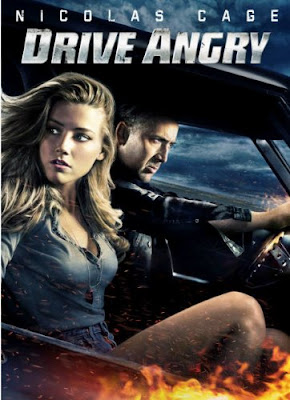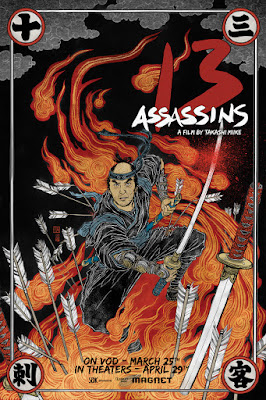4th Annual Southland Tales Award For Film I Liked
For No Damn Reason: Drive Angry: It’s a film that begins with Nicholas Cage
shot gunning four people to death in broad daylight on a city street and ends
with him riding into hell in souped up muscle car as Meatloaf croons in the
background. Somewhere in betwixt there Tom Atkins summarily orders their
execution and Cage drinks Beer from a skull. Not just any beer. Simpler Times.
Fuck Yes.
If you didn’t have fun with this movie the problem is you.
Worst: Your Highness: It’s not a good sign that when a film
startles an accidental laugh out of the audience, a feeling of appalled shame
immediately fills the theater. David Gordon Green is actively trying to murder
Roger Ebert, it’s the only explination I can find for his last two films that makes sense.
Underrated: The Ward: Sure it falls apart mightily in the
end, but John Carpenter’s return to the big screen was far more effective than
most gave it credit for. With a script that’s careful not to cheat (listen
closely to Jared Harris’s dialogue) a dread soaked atmosphere and some very
effective scare sequences. Next time you watch it, think of it as a siege film,
I guarantee it’ll work better. Not perfect, but it’ll make a hell of a double
feature with The Fog.
Overhated: Scream 4: Look I’m not exactly one to go out of
my way to defend Wes Craven, but I was surprised by the way this effective
little Meat and Potatoes slasher film riled everyone up so much. It’s not
great, but it’s not actively embarrassing in the way Scream 2 and 3 were (if
only for the fact that the ghost of Sydney’s mother never points at the camera
and moans “You’re just like meeeee!!!” in order to subtly suggest that Sydney
is afraid of turning into her mother.) As Stephen King once said, “It’s awful
pedestrian but then again so is beer.”
Overrated: Hanna: I don’t get it. Rarely has a disconnect
between myself and a movie been as thorough as this one. I quickly sunk into a
deep stupor as this Bourne Identity by way of Rocky And Bullwinkle’s
Fractured Fairy Tales played out. The tone of the film is so inconsistent that
it feels like Joe Wright was actually angry with his audience when he made the
film. But apparently not as angry as he was at Cate Blanchett who was apparently directed to do her best
impersonation of Dianne Ladd in Wild At Heart. Eric Bana is the only one in the
cast who seems to know what he’s doing.
The action is lack luster and all the fairy tale motifs in the world
can’t hide the fact that this has been done before. Though rarely so ineptly.
Most Pleasant Surprises: Kung Fu Panda 2: Dreamworks sequels
do not exactly have a strong track record for creative integrity. So it’s a
pleasant surprise that Kung Fu Panda did not merely match the charms of its
original (easily the best of the Dreamworks animated films) but surpassed it.
Beautiful animation, innovated fight scenes, and centered on another great Gary
Oldman villain (not to mention Michelle Yeoh's best American role), Kung Fu Panda 2 is for my money the best Kung Fu film given wide theatrical release in
US theaters this side of Hero.
Most Disapointing: Rum Diary: Finding out that Bruce
Robinson was coming out of retirement and then seeing this was like finding out that Santa is real and
then watching him puke from Dope Sickness in the corner of your living room.
Delight curdling into Horror with record speed. (Not to mention making this a three peat for Amber Heard. Did that girl wish to be a movie star on The Monkey's Paw or what?)
10. Sucker Punch: Oh no I dinnit. Oh yes I did. I’ve
written
twice about my reaction to Zack Snyder’s audacious experiment in biting as many of the hands that feed him as he can fit in his mouth at one time and I am unrepentant.
It’s a big insane dare of a movie. Not quite successful, even on it’s own terms,
but all failures should be this spectacular. The ultimate pastiche and a slightly
incoherent shout of J’Accuse to the entirety of geek culture. Say what you will
about Synder’s self immolating act of kamikaze auteurism, there’ll never be
another like it.
9. 13 Assassins: From a director who I admittedly have a bit
of a soft spot for, to one I don’t much care for. I was as surprised as anybody
at how caught up I got in Miike’s Samurai epic. A pure, near perfect genre
film. With a great slow burn set up and an utterly insanse meat grinder of a finale that gets
extended beyond all reason, 13 Assassins is one of those films that doesn’t
merely capture everything you like about a genre, it reminds you why you loved
the genre in the first place.
8. Bridesmaids: My favorite farce since Dirty Rotten
Scoundrels. What strikes me, having watched the film probably about half a dozen times and thusly finely able to see it without water obscuring my eyes, is just
how directed Paul Feig’s film is. So much modern comedy direction is done in
the indifferent Dennis Dugan school and why not? It’s a pretty thankless job.
If you do it right you’re not the one who’ll be getting the attention. But it
makes all the difference in the world. Look at the perfectly timed insert shot
of stunned glee on the face of Helen’s step daughter during the big meltdown
scene. Watch the perfect way that Feig frames Annie’s walk as she boards the
airplane. Ceiling and walls all in claustrophobic view, her eye’s slowly
widening to Doe in the headlights proportions. It’s a comedy crafted with care
on every aspect of it’s production and it’s fucking hysterical. And if you
disagree you’ll have to take that up with my Mexican Drinking Worm. It’s like a
Native American symbol for getting fucked up.
7. Rango: Huh. A Children’s animated film the owes more to
El Topo than Fievel Goes West. Animated in an aggressively abrasive style that
explicitly references Ralph Steadman and at one point features an army of
inbred mountain men sweeping down giant bat creatures as Ride Of The Valkeryies
arranged for the banjo plays in the background. Nope I can confidently say that
I didn’t expect to see any of that. But I’m awfully glad I did.
6. Melancholia: Von Trier’s staggering unblinking ode to
oblivion was one of the most visceral experiences I had this film going
year. More humane than it’s
critics or supporters gave it credit for, it was like watching Ingmar Bergman
become completely unhinged.
I’ve written before about the intensely negative reaction
I’ve had to some of Von Trier’s work and to be honest I would be hard pressed
to say exactly what it was about Melancholia that felt so different. But just
this once it felt as though Von Trier was playing on the level.
5. The Innkeepers: If you didn’t like House Of The Devil,
The Innkeepers probably isn't going to change your mind. Like it’s predecessor, a deliberate (note I didn’t say slow
burning, as an exasperated West put it in Austin “People say my movies are slow but there are
jokes and scares in every scene!") tense film, interested in earning your fear as
opposed to playing cheap. West may be the horror fan’s horror director, but
only because he has takes such obvious care with the genre. With a well
constructed script, elegant style and a preternatural skill at linking the
anxiety of day to day living with a larger supernatural framework, The
Innkeepers is exactly the type of careful horror filmmaking that is often so
lacking in the genre. Ti West’s last film may have been a loving tribute to the
past, but The Innkeepers proves that he is one of the precious few director’s
interested in pushing the genre forward.
4. Midnight In Paris: Beautiful, effervescent and the
funniest thing that he’s done in years (at least fifteen of them by my count)
Allen’s tribute to the art and illusions that sustain us, is by far the best of
his European films and may just be one of his best period. Centered around Owen
Wilson, in a perfect bit of “whoddathunk?” casting, Paris is smart wistful and
beautiful. The fact that it contains the funniest Ernest Hemingway parody of
all time is just gravy.
3. Hugo: A real oddity, a nostalgia piece about endless
possibilities of the future. As a film Hugo is as viscerally made and felt as
any of Scorsese’s. As a tribute to the art form it inhabits it is superlative.
A wonderful film in the true sense of the word.
2. Drive: If Jean Pierre Melville and Sam Fuller had a baby
and that baby was raised by being left in a room with the better films of Peter
Yates, William Friedkin, Seijun Suzuki, Budd Boeticher, and Brian DePalma, and that baby was also raised to be an unabashed romantic. Then that baby would
grow up to give the world Drive. An example of the primal, lizard brained
pleasures of genre film that made me kind of giddy. Is there much more to the
movie than the fact that it is about as stylish and cool as it is possible for
films to be? Not really. But in this case I have to say that that is enough. It’s
the type of film that makes you buy the soundtrack, and makes you walk a little
straighter when it turns up on your iPod. There was no more purely pleasurable film
going experience this year.
1. Tree Of Life: If Drive perfectly illustrated the
pleasures of genre cinema, Tree Of Life can only be called the exemplifier of
the pleasures of turning away from genre and pushing the limits of cinema as far as they can be. I haven’t written about Tree, because
there’s no way for me to intellectualize it. I can only think of it in the
terms of the visercial way I experienced it, which seems like a fairly useless
thing for someone who is not me, to read. The film stirred memories and
sensations within me that I would have thought were dormant or dead. If I had
cared to think about them at all. All
while communicating things that ordinary films don’t even have the framework,
much less the ambition to do.
There’s a moment in the film where a toddler looks at his
new born brother for the first time. Seems to realize that he once was as this
baby is, internalizes the implications of this and starts to cry- and holy crap
did Malick just capture a human being realizing for the first time that he’s
going to die on film? It’s a film that feels like sifting through someone’s
memories and it’s impossible not to consider ones own. The Tree Of Life is a
film where one feels the weight of life, and the sensation of it passing
through. Less like seeing a film than meditating under the Bodhi Tree.



























































































































